About an hour into my encounter with Hugh Laurie, in a suite at the Dorchester in London, he starts protesting at length about how boring his answers to my questions are. He had been talking – rather interestingly – about his theory that television, rather than film, was the medium through which the US "not just projects its image of itself to the world, but actually decides what its image is. It's America's way of conversing with itself about what it believes to be important."
He has just finished telling me that he doesn't think British TV is as interested in expressing grand ideas about identity and purpose – "I think that's a bit highfalutin for us" – when he suddenly brings himself up short. This is all so boring that he is boring himself, he says. He gestures towards the iPhone on which I'm recording the interview. "If I get any duller," he sighs, "I think your phone might actually go: 'Fuck it, I'm not recording this. Really this application is designed to record things of value. I mean, the assumption was you weren't just going to record a man scratching his arse. Because if that's what you're going to do, I'm quitting. Scramble. Escape.'"
This kind of thing is supposed to be par for the course when you interview Laurie. He famously loathes talking to journalists almost as much as he hates being photographed, and his attitude to being photographed would impress a 19th-century Native American: "I really do believe the camera steals the soul. But that may be because I'm worried about my soul. I don't have much of a soul to begin with, I can't afford to lose much." That said, his aversion to being photographed has not precluded him becoming the "spokesmodel" for L'Oreal's male skincare range. "Proudly so!" he says, explaining he uses the money to fund a variety of charitable projects in Africa and claiming he doesn't really know what being a spokesmodel entails: "I made a commercial and I was photographed, I did a poster once. I'll presumably have to do that again. If you're going to ask me questions about skincare, there's not much I can tell you. Don't rub a cheese grater up and down your cheeks. That would be my advice. Don't dunk your face in engine oil or other caustic substances. I don't know anything about it. They sort of ask you to do this thing and you go: 'You're out of your fucking mind, not in a billion years would I consider such a thing.' Then, as they tell you it's a great deal of money, the thought crosses your mind: 'With that money I could build a school in Senegal.' And then you can't say no. Because if you do say no, what you're saying is that your public pose is more important than people getting a school in Senegal or polio vaccinations in Uganda or whatever. You can't do that. You just can't."
Still, he once compared talking to the press to putting his testicles on a chopping board – and, judging by his past interviews, it almost invariably turns into an exercise in caustic self-deprecation and soul-searching, which journalists tend to take as symptomatic of a deeper malaise. Laurie has struggled with depression in the past, and seems big on depicting himself as a man who feels guilty about his apparently undeserved success, who doesn't much enjoy being famous (something of a problem given his eight-year tenure as the titular star of House, which ended last year but at its peak was the most-watched TV show in the world, distributed to 66 countries and for which he commanded £250,000 an episode, getting him in Guinness World Records as the highest-paid actor ever in a TV drama), for whom life was "a gradually descending mist of confusion and doubt" and whose "version of happiness consists of not being happy".
The thing is, today at least, he does not seem much like that at all. He does react a little suspiciously when I say I like his new album, Didn't It Rain, a follow-up to 2011's Let Them Talk, on which he once again performs classic blues songs, music he says he has loved since childhood. "Thank you for saying that, I'm very relieved," he begins, before frowning. "Well, if you mean it. You have to say that otherwise it's going to be awkward, isn't it? 'Heard your album, sort of hated it. Anyway, my first question.' It's a difficult way to kick off, I suppose."
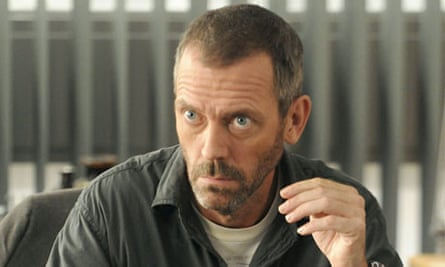
Then again he seems genuinely startled by Let Them Talk's success, perhaps with good reason. Actors who parlay their fame into recording careers rarely have as smooth a ride as Laurie seems to have done. Despite a case of nerves in the studio that could be stayed only with "proper and sensible applications of whisky and beta-blockers and picking the right people to be around you – people who, even if they are rolling their eyes and going 'What a wanker', at least have the grace to do it behind your back", Let Them Talk was both well-reviewed and big-selling. He says he didn't read what anybody wrote about it – "it seems to me if you want to be protected from the unpleasant stuff, you can't go just reading the good stuff, that seems wrong" – but he can't have missed the gold albums and the sold-out tours. "I know that it did all right, and I was surprised by it. When people buy a ticket, that I sort of understand, it says my name on it and they've watched the television show, and they think: 'Ah well, if nothing else, we'll see the bloke off the TV.' But buying a record, you don't get that, you don't get the visual. So I was very, very surprised that people were able to make the sort of adjustment. Because, to be perfectly honest, I'm not sure I would." He thinks for a moment. "For example, Clive Dunn," he says, a little unexpectedly. "Splendid. Clive Dunn, as I understand it, retired to the south of Spain, where he worked extensively in watercolours. I don't own any of Clive Dunn's watercolours. I loved him in Dad's Army, loved him. But not enough to actually seek out his watercolour work."

For someone who apparently hates being interviewed so much it can threaten to bring on a panic attack – "I don't like the act of talking, it makes me slightly light-headed," he protests when his PR ventures in from the room next door to ask how it's going. "I get a bit … is it hypertensive or hypotensive? Anyway, the brown paper bag thing" – Laurie is thoughtful and engaging, very funny, extremely sharp, given to long answers that deviate from the question and frequently end with him asking questions of himself. In fact, he is such jolly company, it is hard not to wonder if the loudly expressed ennui, the stuff about not having a soul and the threats to start hyperventilating are really glimpses into the tortured self-doubting soul that broils beneath. I just think he finds being Eeyorish funny, which in fairness, in his hands, it is: "If a thing's worth doing, it's almost automatically not worth doing because everyone else is doing it, that seems to be the way of the modern world," he says. "'You have to go to this great restaurant.' Well, no, we can't, because you've said that now and therefore it's going to be a nightmare because everyone else is there. I want to go to an empty restaurant. Not that I hate people, you understand," he adds. "But there are a lot of them, if you look around."
Perhaps success has changed him. He certainly thinks the success of House has made him more confident, in a way that his previous successes – whether as a world-class schoolboy rower, or as part of the Footlights team that won the first Perrier award, or as one half of Fry and Laurie, or in Blackadder – failed to do. "It did. I've never really owned up to that before. Well, no one's ever noticed it actually, so bravo. I always felt I wasn't really sure whether I belonged, whether I was good enough. You know, I never went to drama school, I don't have any certificates saying: 'He's a qualified actor.' But I did think that House was something I didn't have to apologise for. It was something I was really proud of and it was sort of … whether you liked it or not, it was undeniable. You don't have to explain who you are to an audience and you also don't have to explain who you are to the people you work with. I always found that incredibly hard. You go on a set and you just know that the last person the camera operator photographed was Robert De Niro and you have this in your head, he's just going: 'Oh, for fuck's sake.' Once an audience or the people you're working with at least know why you're there, they're not questioning it, they're not going: 'What? Why? Who the fuck's this guy?' That does make a big difference."
He even seems to have come to terms with being recognised all the time, which at one point is supposed to have bothered him so much that he took to wearing a crash helmet in the street to avoid detection. The repercussions of being in such a huge TV show – which furthermore turned him into a sex symbol, a subject he clearly doesn't enjoy being addressed ("it's pish and tosh") – still affect his life, he says. Before he went on holiday to India recently, he checked whether House was shown there, as that would dictate whether he could use public transport (it wasn't, he did). And he recalls the time five years ago when he went to Spain. "I went to the Gaudi cathedral in Barcelona and I wasn't able to look up at it, because there were so many tourists around and they were all with cameras. I was looking at the ground, taking pictures of the cathedral and then looking at them on my camera, because I didn't dare look up. It was just crazy. It was crazy. People running towards you, running. But it's negligible, really. There are many, many worse things in the world."
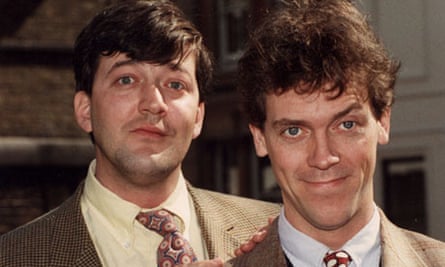
Nevertheless, he seemed more relieved than anything when House ended, immediately informing the press that he was never going to make another TV series again. "Did I? No, I'm sure I didn't say that. If I did say something like it, what I meant was I didn't want to sort of bounce straight into another thing. You don't get divorced on a Tuesday and married again on a Saturday. Apart from anything else I'm not sure that I could physically do it, to be the lead of a thing, to be in every scene and to take responsibility for something … it's hard going. It doesn't seem like it, of course, but it's hard going if you care about it. You know, brain surgery's not difficult if you don't care whether the person dies, it's actually quite easy. Flying a plane is quite easy if you don't mind crashing. That's what hard means. It's an expression of how much you care about the result. And if you are proud of it, or you believe it can be good and you want it to be good, then it can be sort of infinitely hard, to the point where it can drive you a bit bonkers."
He doesn't miss the workload – "I'm really taking to not going to work at five in the morning" – and the series's end means he can spend more time in Britain, after years of spending nine months out of 12 working in LA. Not, he adds, that he is complaining about LA.
"I've got very little sympathy with actors who come back and go: 'I'm just a real bloke, you know, all that Hollywood bullshit.' Oh, fuck off. It's such wank. It's a lie that the British press wants to be told that LA is very shallow, glitzy, venal, superficial, all that stuff. British readers find it very comforting. 'Yes, that's why my ancestors didn't cross the Atlantic with the pilgrim fathers. They knew that it would end up as Sodom and Gomorrah and life in Chipping Norton is actually much realer.' I'm damned if I'm going to use the conventional cliche about Los Angeles. There's good and bad. There are great things about Los Angeles. The trees are fantastic: some of the best trees you'll see anywhere. The architecture: miserable, looks like a petrol station. Very, very clever people; very, very ambitious people. Clever ambitious people can make for slightly untrustworthy people, but sometimes the intelligence and ambition are quite exhilarating in their own way. You wouldn't necessarily want to turn your back on them, but I've known people like that in other parts of the world."

Nevertheless, he gives the impression of being noticeably less interested in a career in Hollywood than he is in making records and performing music: you get the feeling he thinks being offered a chance to make records is pretty much the best thing to have resulted from House's success. He is about to appear in Disney's sci-fi film Tomorrowland, but says he turned down the role as the lead villain in the remake of Robocop because it clashed with a recording session.
When I ask him if he prefers music to acting, he doesn't think about his answer. "Yes. I do. There's a sensual pleasure involved in making sounds, harmonious sounds, that I just can't get, and I don't think anyone can quite get, from acting. The end of a day filming is just an audit of all the things you did wrong. It's like: 'Fuck, I didn't think of that, if only I'd done this, if only I'd done that.' With music, you can hit bum notes and you can do all kinds of things wrong, but the sensual pleasure of playing a chord or some sort of groove, and the drummer joins in, a bass player joins in and just for that moment, that is the most exquisite pleasure there is. It just cannot get better than that. It takes over my whole body in a way that acting just can't."
As he talks about it, he doesn't look like a man who is boring himself. "There's just nothing, nothing like it. Nothing like it. It's almost … it's almost indecent, how pleasurable it is. Which is why a lot of regions ban it." Then he frowns, and the Eeyorishness returns. "As they should," he adds, heavily.
Didn't It Rain is out on Monday.
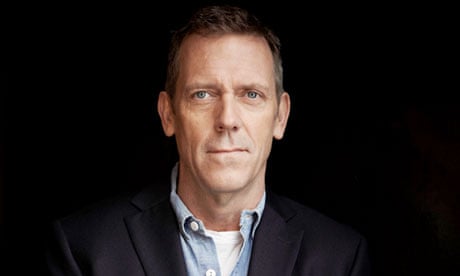
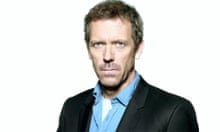
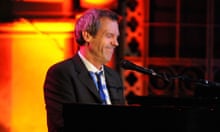
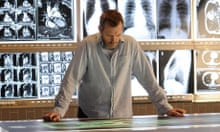
Comments (…)
Sign in or create your Guardian account to join the discussion